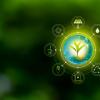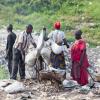
IIASA Advancing Systems Analysis Program Director, Elena Rovenskaya, contributed to the United Nations Educational, Scientific, and Cultural Organization (UNESCO) toolkit called “Mathematics for action: supporting science-based decision making” with a brief on allocating scarce resources modeling to support food-energy-water sustainability.
The toolkit showcases the power of mathematical modeling to address sustainability challenges and will be launched on 14 March 2022 as part of the celebrations of the International Day of Mathematics. It is also part of the International Year of Basic Sciences for Sustainable Development 2022 (IYBSSD 2022). The brief authored by Rovenskaya discusses the work of IIASA researchers and their collaborators in China on modeling the food-energy-water nexus in the face of uncertainty in future water supply.
“Global freshwater supplies are increasingly under stress due to the combined effects of population growth, increasing urbanization and industrialization, and climate change. Mathematical modeling provides the means to allow decision makers to optimize water use across sectors while taking into account uncertainties over future water availability,” explains Rovenskaya.
The brief has three key messages:
- An integrated approach to food-energy-water nexus management ensures solutions that are more favorable to sustainability than those made in silos. In the face of huge increases in demand for food, energy, and water over the next decades, nexus management will be more efficient across sectors and regions and will enable optimal use of limited resources.
- Future water availability is highly uncertain as it depends on weather variability and climate change. Ignoring uncertainty can increase both costs and risks. Uncertainty should be taken into account in decisions to invest in new technologies and solutions with a longer time horizon for return.
- Mathematical modeling offers options for optimizing upfront investments in water-saving technologies and water use to ensure the desired level of domestic food and energy security given the uncertainties.
“Sustainability transitions rely on processes that involve numerous uncertainties, and these must be addressed in the models used to inform such transitions. Unique mathematical approaches allow the inclusion of probabilities to meet desired objectives, giving decision-makers additional space to maneuver towards reaching sustainability goals,” Roveskaya concludes.
Click here to access the full brief.
Reference
Gao, J., Xu, X., Cao, G., Ermoliev, Y.M., Ermolieva, T.Y., Rovenskaya, E.A. (2018). Optimizing Regional Food and Energy Production under Limited Water Availability through Integrated Modeling. Sustainability 10, 1689. [pure.iiasa.ac.at/15299]
Gao, J., Xu, X., Cao, G.-Y., Ermoliev, Y., Ermolieva, T., Rovenskaya, E. (2021). Strategic decision-support modeling for robust management of the food–energy–water nexus under uncertainty. Journal of Cleaner Production 292, e125995. [pure.iiasa.ac.at/17020]
News

05 June 2024
The 2024 State of CDR Report: Scaling up CO2 removal to meet Paris Targets

23 April 2024
US Permanent Representative to International Organizations in Vienna visits IIASA

15 April 2024
